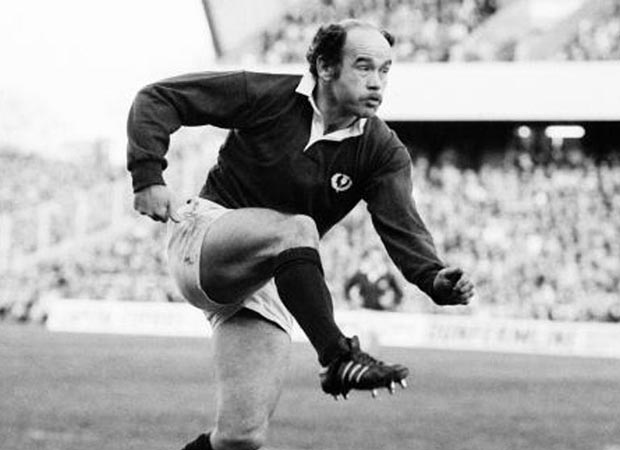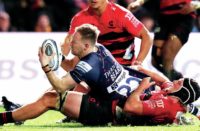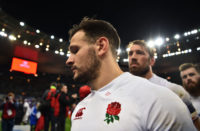 Long before he passed away, Mervyn Davies confessed that his errant captaincy had cost Wales a third Grand Slam in four seasons. The match in question – Scotland in Edinburgh on St David's Day 1975 before a world record attendance of 104,000 – has a certain enduring relevance. Wales are back at Murrayfield next Sunday, the 40th anniversary of an occasion which will never be forgotten by the multitude who witnessed it.
Long before he passed away, Mervyn Davies confessed that his errant captaincy had cost Wales a third Grand Slam in four seasons. The match in question – Scotland in Edinburgh on St David's Day 1975 before a world record attendance of 104,000 – has a certain enduring relevance. Wales are back at Murrayfield next Sunday, the 40th anniversary of an occasion which will never be forgotten by the multitude who witnessed it.
Having smashed France in Paris despite picking six new caps and then duly beaten England in Cardiff, the new Wales travelled north backed by an army of fans estimated at 45,000. They had never mobilised on such a scale before or since.
As their team bus converged on Murrayfield, the Scots could hardly believe their eyes. “Wherever you looked, it was like a sea of red,'' said Jim Renwick, then a 23-year-old centre making a name for himself as one of the smartest of midfield operators. “We were wondering how they would get them all in.
“Everyone outside Scotland reckoned Wales would win and probably a fair few folk in Scotland as well. What I couldn't understand about Wales that day was why Phil Bennett wasn't in the team.''
And thereby hangs a tale of intrigue, political machination – call it what you will. Bennett, the mercurial ringmaster of the Lions' invincible trek round South Africa the previous summer, had withdrawn from the then annual trial match before Christmas.
The selectors took a dim view. They dropped their hitherto untouchable fly-half not just from the team and the reserves but the squad. John Bevan, the accomplished Aberavon No.10 not to be confused with his Lions' compatriot who had decamped to Rugby League, took over.
David Richards, a Lion-in-the-making but 40 years ago a novice at Swansea barely out of his teens, came from nowhere as the back-up. When injury removed him from the Murrayfield equation, the ‘Big Five' selectors reinstated Bennett as bench cover.
Nobody had any way of knowing how big a hand fate would play in bringing the favourites to grief. A fractured cheekbone had no sooner put paid to Bevan than Wales lost their place-kicker, Steve
Fenwick.
Bennett hardly had time to play himself in than he was being asked to take a shot at goal. What happened next prompted Davies, the most astute of leaders, to take responsibility for a “silly defeat”.
“It was a defeat I must shoulder the blame for,'' he said in his autobiography, In Strength And Shadow. “A defeat that cost us yet another Grand Slam.
“I made some poor judgment calls. The worst was when I asked a jittery Phil to take a penalty kick, a kick he was completely unprepared for.
“Phil told me he didn't fancy it but I ignored him. As captain, I should have respected his wish, recognised his doubts and asked someone else to step up. In the end, he missed and we gifted victory to the Scots.''
Allan Martin, the last of the torpedo-style second row place-kickers, missed converting Trevor Evans' touchline try with the last kick and Scotland were home 12-10 thanks to goals from Dougie Morgan and Ian McGeechan.
Renwick, a Lion in his own right in South Africa in 1980, remembers a bruising encounter with his opposite number and fellow electricity board linesman, the late Ray Gravell.
“He'd hit you late and help pick you up if he could,'' Renwick says with a chuckle. “Then when you're gasping for breath, he'd say, ‘you all right, Jim, how's the wife, and kids….' There was another time when he came up to Hawick all dressed up in a kilt and brandishing a sword.
“He had the pub rocking all night. What a man.
“Bill McLaren was my rugby master at school in Hawick and he always reckoned the Seventies was the best time of all because the game was played off the cuff. Nowadays the players are told what to do by the coaches.''
The St Valentine's weekend match will be very different to the one 40 years ago. Back then, when it was still a game for all sizes, Renwick weighed in at just over 12 stone. Two of his opponents, Gerald Davies and JJ Williams, barely topped 11 stone.
“I like players who instinctively play what's in front of them, not this robotic stuff where you go through phase after phase,'' he says. “It's not my cup of tea. At school, Bill McLaren would never let us do any celebrating when we scored tries because we had to respect the opposition.
“I think they're a bit over the top now. But that's the modern way. I watched Andy Murray in the Australian Open final and he was pumping his fist after every point. Every point! It's the way of the world but very different from my time.
“I'm not moaning. You still see great rugby but it's a totally different game. I bumped into Gerald Davies a while back and I says to him, ‘how would you like to play against those monsters on the Welsh wings?' And he said, ‘okay, if I'm on the same side but otherwise a complete nightmare'.
“We were always encouraged to look for space rather than the man. There's so much less room now because generally defences are on top.
“I need a new knee because of wear-and-tear over the years but I shudder to think what the big current players will be like at my age. The game is so much more physical that to compare it with the Seventies is to compare night and day.''
For the benefit of those who never saw him, Jim Renwick was some player…
*This article was first published in The Rugby Paper on February 8.




























Pingback: ติดตั้ง ais fiber
Pingback: Tankless Water Heater Repair Plumbers Near Me